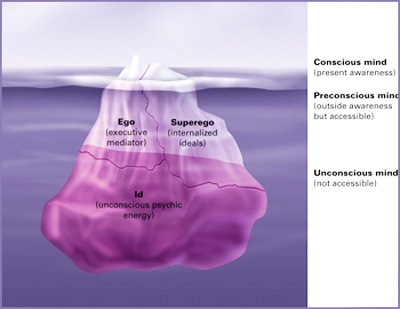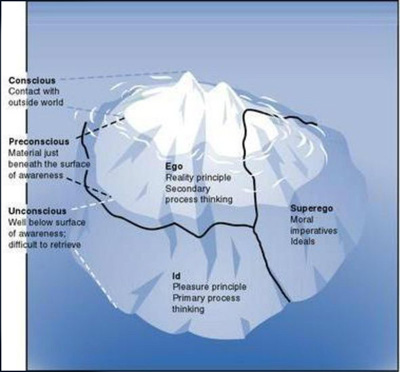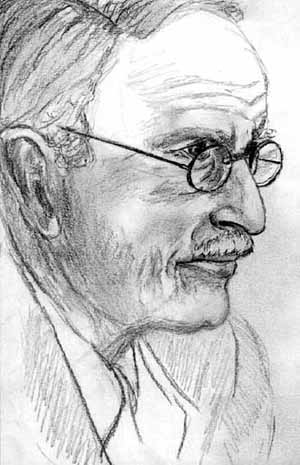Personalidades
 |
 |
 |
 |
 |
 |
 |
La visión mecanicista de Freud
de la psique humana
Continuando con mi estudio de las ideas de Freud, me centraré hoy en su visión general de la psique humana y de la naturaleza del hombre en general.
En muchos de sus estudios y conferencias menores, Freud abordó esos temas, pero fue en su último trabajo analítico sobre la psique humana que postuló sus teorías en una forma más completa. Este fue su famoso The Ego and the Id , una obra que publicó en 1923 en Viena Austria fue su trabajo final sobre Psicoanálisis propiamente dicho.

 En este trabajo, Freud revela su concepción completa de la psique, su visión general sobre cómo funciona la mente humana.
En este trabajo, Freud revela su concepción completa de la psique, su visión general sobre cómo funciona la mente humana.
Dividió la mente del hombre en tres partes principales.
El primero es el ego , la parte consciente del hombre. El hombre camina, piensa y toma decisiones conscientes: Contemple el ego .
La segunda parte es el inconsciente , la parte más importante de donde provienen todos los impulsos instintivos: las pasiones, la sexualidad, la capacidad de sentir, odiar e incluso amar a los hombres.
Finalmente, la tercera parte es el superyó , que es el conjunto de nuestras leyes morales, reglas y defensas mentales que de alguna manera nos protegen de la fuerza de nuestros instintos inconscientes.
Llamó a estas partes el ego , el id y el superyó . Constituyen la base de su teoría sobre cómo funciona la mente humana. Para él, estas tres partes son siempre activas e influyen entre sí.
Para él, la parte más primitiva es el inconsciente o id , que, en última instancia, es responsable de los deseos, los actos de voluntad y los anhelos más profundos del alma humana. .
Freud era completamente ateo y materialista. Como científico típico del siglo XIX, se vio influenciado por el positivismo, aunque nunca lo admitió ni habló de ello.
Odio por la filosofía y las religiones
Quiero enfatizar que en este estudio Freud demostró su odio por la filosofía y la religión. Pensaba que eran enemigos naturales de la ciencia, que colocó en el primer y único lugar de importancia. Para él, el estudio de cualquier disciplina que no sea la ciencia fue un obstáculo para la marcha del progreso en la sociedad. Establece este punto de vista en su libro El futuro de una ilusión , escrito en la década de 1930.
Casi todos los biógrafos de Freud informan su fuerte aversión desde su infancia a la filosofía, la religión e incluso la música. Por ejemplo, a petición suya, sus padres le prohibieron a su hermana, que tenía un claro talento para el piano y un gusto por la música clásica, estudiar y tocar este instrumento porque, según el joven Segismundo, "era un obstáculo para su estudio de las ciencias." Ni siquiera podía soportar el sonido de un piano. Más tarde, su hermana se quejó fuertemente de esta imposición.
Pudo imponer sus inclinaciones porque era el único hijo varón de una familia judía tradicional que cumplía con los caprichos de un hijo.
Más tarde, le diría a su joven discípulo Carl Gustav Jung, quien luego se convirtió en un enemigo ideológico, que el psicoanálisis debería alejarse por completo de los "peligros" de la filosofía.
Freud pagó un alto precio por no reconocer a los grandes maestros del pensamiento filosófico.
No olvidemos que Platón declaró que "la filosofía es el pensamiento que explica la verdadera naturaleza de la realidad". La filosofía nos enseña a pensar. Estudiarlo es absolutamente necesario para cualquiera que quiera comprender profundamente las cosas y al hombre.
Freud odiaba todo esto y terminó siendo víctima de los errores positivistas de su época.
 He believed that algún día la ciencia encontraría en el cerebro humano lo que él identificó como las estructuras de la personalidad humana, es decir, el ego , el id y el superyó . Esto configuraría un sistema de pensamiento mecanicista, caprichoso y simplista.
He believed that algún día la ciencia encontraría en el cerebro humano lo que él identificó como las estructuras de la personalidad humana, es decir, el ego , el id y el superyó . Esto configuraría un sistema de pensamiento mecanicista, caprichoso y simplista.
Ahora bien, Aristóteles en sus estudios de Metafísica ya afirmó que "el ser opera de acuerdo con su naturaleza". Esto significa que una cosa material solo puede producir otra cosa material. Así, por sí mismo, el cerebro humano, que es materia, carne, no puede producir conciencia, voluntad o los pensamientos abstractos del hombre.
Un pedazo de carne como el cerebro humano, aunque complejo con sus hormonas, sinapsis y red natural de neuronas, no puede producir abstracciones, pensamientos y otras acciones espirituales típicas de los seres humanos.
Una televisión o una radio pueden transmitir programas, pero no pueden producirlos. Así también, el cerebro humano puede transmitir ideas pero no las produce. Son elaborados por el alma humana.
Por lo tanto, Freud, como tantos otros autores materialistas y ateos, erró descaradamente.
Para Freud, el hombre no es más que una masa de células, nervios y hormonas. Con esta tesis perjudica enormemente la libertad humana y la concepción correlacionada del libre albedrío. El hombre se vuelve incapaz de "libre" y totalmente "decidir" sus acciones. Se convierte en una víctima de sus miedos, pasiones y deseos inconscientes.
Esto equivale a renunciar a la libertad de tomar decisiones y asumir sus consecuencias en este mundo y en el próximo. En el análisis final, el hombre es un ser irresponsable y caprichoso.
Debo decir que Freud no pidió abolir los castigos para todo tipo de delincuentes en la sociedad. Pero esta es la conclusión a la que llegamos naturalmente cuando estudiamos su visión extremadamente pesimista de la naturaleza humana.
Hoy, la mayoría de los psicoanalistas ya no respaldan una noción tan sombría de la humanidad. Un gran movimiento en el campo está tratando de repensar las ideas mecanicistas y simplistas de Freud. El psicoanálisis se está volviendo a examinar de arriba a abajo.
Espero que estas revisiones lleguen al meollo de la cuestión, que es la verdadera naturaleza del alma humana.
En mi próximo artículo, planeo abordar el papel de Carl Gustav Jung en la destrucción del sistema de Freud y la importancia de la Religión para la estabilidad de la psique humana.
Continúa
En muchos de sus estudios y conferencias menores, Freud abordó esos temas, pero fue en su último trabajo analítico sobre la psique humana que postuló sus teorías en una forma más completa. Este fue su famoso The Ego and the Id , una obra que publicó en 1923 en Viena Austria fue su trabajo final sobre Psicoanálisis propiamente dicho.

La metáfora del iceberg para comprender el ego, id y superyó

Dividió la mente del hombre en tres partes principales.
El primero es el ego , la parte consciente del hombre. El hombre camina, piensa y toma decisiones conscientes: Contemple el ego .
La segunda parte es el inconsciente , la parte más importante de donde provienen todos los impulsos instintivos: las pasiones, la sexualidad, la capacidad de sentir, odiar e incluso amar a los hombres.
Finalmente, la tercera parte es el superyó , que es el conjunto de nuestras leyes morales, reglas y defensas mentales que de alguna manera nos protegen de la fuerza de nuestros instintos inconscientes.
Llamó a estas partes el ego , el id y el superyó . Constituyen la base de su teoría sobre cómo funciona la mente humana. Para él, estas tres partes son siempre activas e influyen entre sí.
Para él, la parte más primitiva es el inconsciente o id , que, en última instancia, es responsable de los deseos, los actos de voluntad y los anhelos más profundos del alma humana. .
Freud era completamente ateo y materialista. Como científico típico del siglo XIX, se vio influenciado por el positivismo, aunque nunca lo admitió ni habló de ello.
Odio por la filosofía y las religiones
Quiero enfatizar que en este estudio Freud demostró su odio por la filosofía y la religión. Pensaba que eran enemigos naturales de la ciencia, que colocó en el primer y único lugar de importancia. Para él, el estudio de cualquier disciplina que no sea la ciencia fue un obstáculo para la marcha del progreso en la sociedad. Establece este punto de vista en su libro El futuro de una ilusión , escrito en la década de 1930.
Casi todos los biógrafos de Freud informan su fuerte aversión desde su infancia a la filosofía, la religión e incluso la música. Por ejemplo, a petición suya, sus padres le prohibieron a su hermana, que tenía un claro talento para el piano y un gusto por la música clásica, estudiar y tocar este instrumento porque, según el joven Segismundo, "era un obstáculo para su estudio de las ciencias." Ni siquiera podía soportar el sonido de un piano. Más tarde, su hermana se quejó fuertemente de esta imposición.
Pudo imponer sus inclinaciones porque era el único hijo varón de una familia judía tradicional que cumplía con los caprichos de un hijo.
Más tarde, le diría a su joven discípulo Carl Gustav Jung, quien luego se convirtió en un enemigo ideológico, que el psicoanálisis debería alejarse por completo de los "peligros" de la filosofía.
Freud pagó un alto precio por no reconocer a los grandes maestros del pensamiento filosófico.
No olvidemos que Platón declaró que "la filosofía es el pensamiento que explica la verdadera naturaleza de la realidad". La filosofía nos enseña a pensar. Estudiarlo es absolutamente necesario para cualquiera que quiera comprender profundamente las cosas y al hombre.
Freud odiaba todo esto y terminó siendo víctima de los errores positivistas de su época.

Jung, primero fue discípulo de Freud, luego se convirtió en su enemigo mortal.
Ahora bien, Aristóteles en sus estudios de Metafísica ya afirmó que "el ser opera de acuerdo con su naturaleza". Esto significa que una cosa material solo puede producir otra cosa material. Así, por sí mismo, el cerebro humano, que es materia, carne, no puede producir conciencia, voluntad o los pensamientos abstractos del hombre.
Un pedazo de carne como el cerebro humano, aunque complejo con sus hormonas, sinapsis y red natural de neuronas, no puede producir abstracciones, pensamientos y otras acciones espirituales típicas de los seres humanos.
Una televisión o una radio pueden transmitir programas, pero no pueden producirlos. Así también, el cerebro humano puede transmitir ideas pero no las produce. Son elaborados por el alma humana.
Por lo tanto, Freud, como tantos otros autores materialistas y ateos, erró descaradamente.
Para Freud, el hombre no es más que una masa de células, nervios y hormonas. Con esta tesis perjudica enormemente la libertad humana y la concepción correlacionada del libre albedrío. El hombre se vuelve incapaz de "libre" y totalmente "decidir" sus acciones. Se convierte en una víctima de sus miedos, pasiones y deseos inconscientes.
Esto equivale a renunciar a la libertad de tomar decisiones y asumir sus consecuencias en este mundo y en el próximo. En el análisis final, el hombre es un ser irresponsable y caprichoso.
Debo decir que Freud no pidió abolir los castigos para todo tipo de delincuentes en la sociedad. Pero esta es la conclusión a la que llegamos naturalmente cuando estudiamos su visión extremadamente pesimista de la naturaleza humana.
Hoy, la mayoría de los psicoanalistas ya no respaldan una noción tan sombría de la humanidad. Un gran movimiento en el campo está tratando de repensar las ideas mecanicistas y simplistas de Freud. El psicoanálisis se está volviendo a examinar de arriba a abajo.
Espero que estas revisiones lleguen al meollo de la cuestión, que es la verdadera naturaleza del alma humana.
En mi próximo artículo, planeo abordar el papel de Carl Gustav Jung en la destrucción del sistema de Freud y la importancia de la Religión para la estabilidad de la psique humana.
Continúa
Publicada el 9 de diciembre de 2019
______________________
______________________


